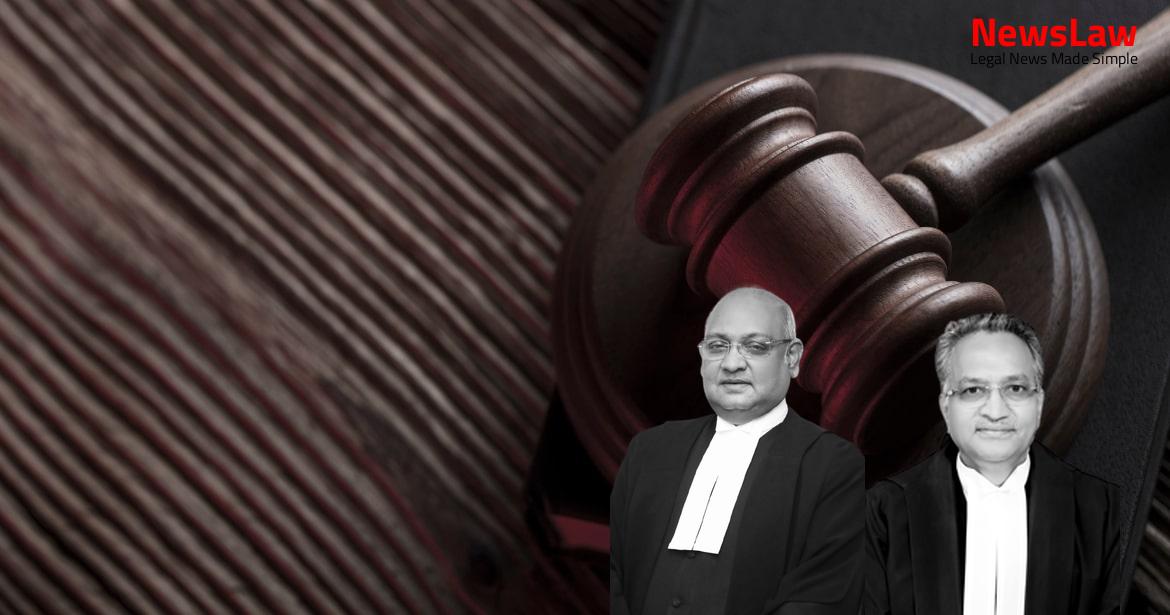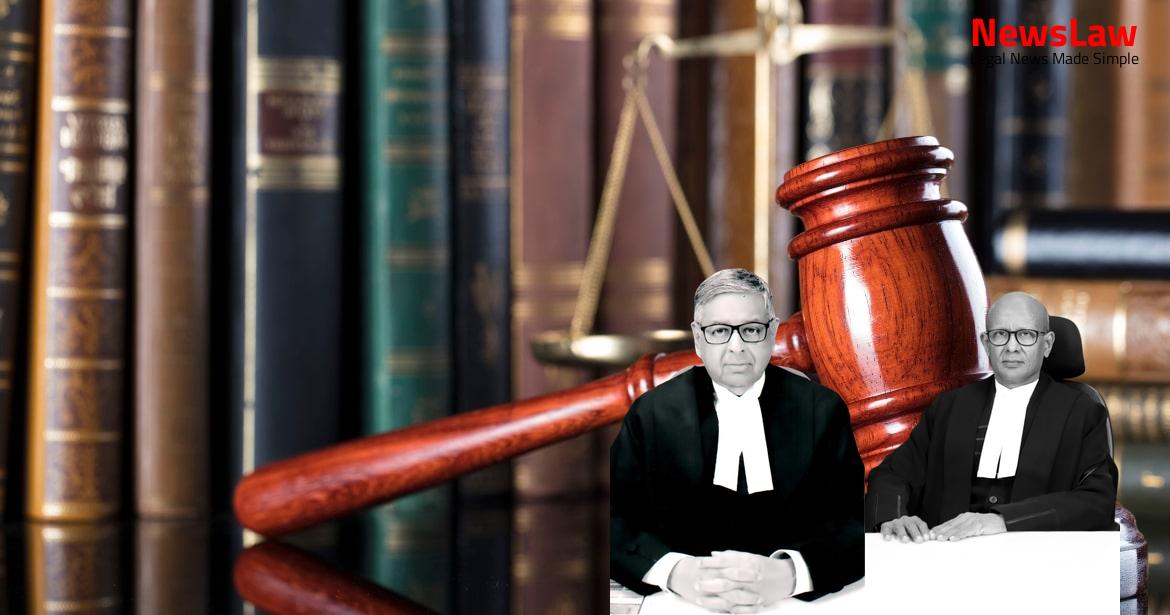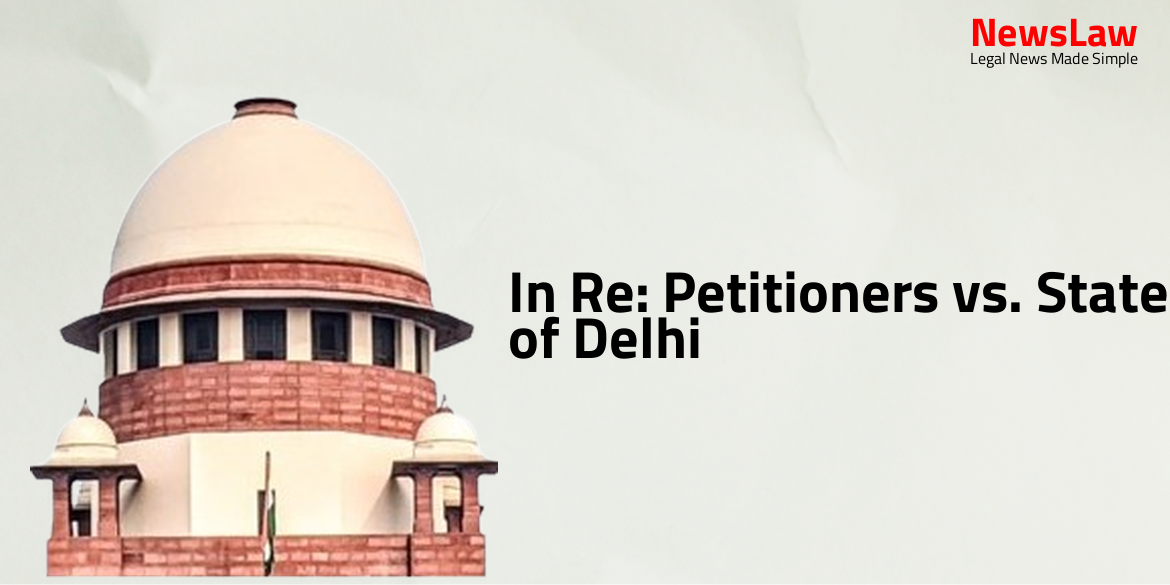In a significant legal battle over the partition of land, the Supreme Court of India delivered a crucial judgment concerning the ancestral property of Sukhdeo. The case involved the implications of the Hindu Succession Act and examined the application of the rule of survivorship. Stay tuned to explore the intricate details of this landmark decision.
Facts
- The appellant filed a suit claiming ownership and possession of land in Village Barra.
- After the death of Sukhdeo, the land was mutated in the names of Janakram’s grandsons.
- It was claimed that Janakram and Pilaram had partitioned the property after Sukhdeo’s demise.
- The Trial Court dismissed the suit, stating that the appellant was not entitled to any share.
- The Appellate Court reversed the Trial Court’s decision, allowing the appeal and dismissing the suit.
Also Read: Balancing Justice: Case Summary of C.P. No. 16/2017
Issue
- The High Court considered the matter of whether the suit property was held by Janak Ram in his own right to the exclusion of Pila Ram and whether the rule of succession or the rule of survivorship shall apply.
- The High Court reviewed whether the disputed land remained entered in joint and united accounts of Janakram, Laxminbai, and the plaintiff up to the year 1982.
- The High Court questioned whether the plaintiff is entitled to half share in the disputed lands and whether the plaintiff is entitled to obtain possession of the disputed lands.
- The High Court examined if the suit land inherited by late Janak Ram from his father Sukhdeo became ancestral property for the plaintiff both at the time of Sukhdeo’s death in 1965 and Janak Ram’s death in 1982.
- The High Court analyzed if the disputed land was received by Janakram in a specific partition and whether the suit of the plaintiff is maintainable.
- The First Appellate Court’s operative order was discussed, where the appeal of the appellant was accepted, and the plaintiff/appellant was granted possession of half share of the disputed land through partition.
- The High Court mentioned that the respondents-original defendant Nos. 1 to 4 filed a second appeal, and two substantial questions of law were formulated, including whether the plaintiff, being female, had the right to partition to the property solely belonged to Sukhdeo and devolved upon Janak Ram by survivorship after Sukhdeo’s demise.
Also Read: Judgment by Supreme Court of India in M/s. Bhilwara Processors Ltd. vs. Department of Central Excise
Arguments
- The suit property was acknowledged as ancestral property in the hands of Sukhdeo by the appellant.
- The appellant has disagreed with the decision of the High Court based on established factual position and previous decisions by the Supreme Court.
- The appellant referenced cases like Gurupad Khandappa Magdum Vs. Hirabai Khandappa Magdum and others, Ramesh Verma Vs. Lajesh Saxena and another, Chandrakanta Vs. Ashok Kumar and others, Hardeo Rai Vs. Sakuntala Devi and others, Commissioner of Wealth Tax, Kanpur Vs. Chander Sen and others, Yudhishter Vs. Ashok Kumar, and Smt. Raj Rani Vs. Chief Settlement Commissioner, Delhi and others to support their argument.
- The appellant argues that the High Court did not make any significant error necessitating intervention from the Supreme Court.
Also Read: Agarwal v. Family Court: Resolving Document Production Dispute
Analysis
- The court analyzed the implications of Section 8 of the Hindu Succession Act, 1956 on the devolution of property inherited by a son from his father.
- It was noted that after the death of Sukhdeo in 1965, the property devolved upon his two sons, Janakram and Pilaram, who succeeded to the ancestral property equally.
- The court emphasized that once a partition of coparcenary property takes place and a coparcener is put in exclusive possession of the property falling to his share, he acquires an absolute right over that property.
- The court highlighted the argument that property inherited by a Hindu under Section 8 of the Hindu Succession Act would not be considered Hindu Undivided Family (HUF) property in respect of his own sons.
- It was concluded that the granddaughter, Radha Bai, had a mere spes successionis and could only challenge the sale deed executed by Janak Ram if it was found to be without consideration or executed through force.
- The court held that the granddaughter, as a Class-I heir, had no claim in the suit property and that the rule of survivorship did not apply in this case.
- The court referenced the preamble to the Act, which aimed to amend and codify the law relating to intestate succession among Hindus, in interpreting the provisions of the Act.
- The court reiterated that the property which devolved upon the father of the respondent could not be said to be HUF property as per the provisions of the 1956 Act.
- It was noted that Janakram, being the exclusive owner of the suit property, had the right to dispose of it as he desired, which he did by selling it to the defendants.
- The court highlighted the importance of proving that the sale deed was without consideration or executed under duress in challenging such transactions.
- Any text, rule, or interpretation of Hindu law or any custom or usage in force before the commencement of the Act ceases to have effect with respect to any matter provided in the Act.
- Any other law in force before the Act ceases to apply to Hindus if it is inconsistent with the Act.
- Section 6 of the Act deals with the devolution of interest in coparcenary property for male Hindu deaths after the Act’s commencement.
- A male Hindu’s interest in Mitakshara coparcenary property devolves by survivorship among surviving coparcenary members.
- If the deceased male Hindu has specified female relatives in Class I of the Schedule, the property interest devolves by testamentary or intestate succession under the Act.
- Explanation 1 clarifies that a Hindu Mitakshara coparcener’s interest is deemed as the share that would have been allotted to him in a hypothetical partition before his death.
- Explanation 2 states that a person who has separated from the coparcenary before the deceased’s death cannot claim a share in the property interest specified in the proviso on intestacy.
- Under Mitakshara School of Hindu Law, all property of a Hindu joint family is held collectively by coparceners in a quasi-corporate capacity.
- In the case of assets of a business left by the father in the hands of his son, it will be governed by Section 8 of the Hindu Succession Act, and the son would take it in his individual capacity.
- Section 4 of the Hindu Succession Act provides for the overriding effect of the Act in case of doubt, directing to follow the Act over pre-existing Hindu law.
- Upon the birth of a son under Hindu law, he automatically acquires a share in the father’s property and becomes part of the coparcenary, as opposed to inheriting upon the father’s death.
- Section 8 of the Hindu Succession Act, 1956 has impacted the traditional Hindu law by altering the status of how a son inherits property and no longer takes it as the kart of his undivided family, but in his individual capacity.
- Saheblal predeceased his father Janakram and grandfather Sukhdeo.
- Janakram’s property could not have passed to Saheblal during his lifetime.
- The appellant, being Saheblal’s daughter, cannot claim a higher right than Saheblal.
Decision
- The appeal has failed based on settled legal position.
- Grounds urged by the appellant have been rejected.
- All pending applications have been disposed of in the same manner.
- The case is dismissed with no order as to costs.
Case Title: RADHA BAI Vs. RAM NARAYAN
Case Number: C.A. No.-005889-005889 / 2009



